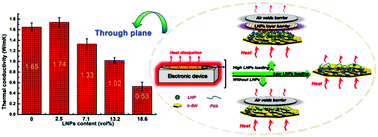Thermally conductive, super flexible and flame-retardant BN-OH/PVA composite film reinforced by lignin nanoparticles†
Abstract
The usage of thermally conductive materials is limited due to their low thermal conductivity, poor thermal stability and brittleness, particularly at high working temperatures. In this work, for the first time, lignin nanoparticles (LNPs) were utilized to enhance the thermal conductivity, stability, flame-retardancy, and flexibility of boron nitride (BN)-OH/polyvinyl alcohol (PVA) composite film, which played an important role as reinforcements. BN-OH/PVA/LNP composite film was fabricated through vacuum filtration in conjunction with chemical cross-linking. With the loading of LNPs at 2.5 vol%, the BN-OH/PVA/LNP composite film exhibited a higher through-plane thermal conductivity (up to 1.74 W m−1 K−1) than the one without LNPs (1.65 W m−1 K−1). After cross-linking with glutaraldehyde (GA), the elongation of the composite at break was 132%, an increase of 267% compared with the non-crosslinked one. The initial decomposition temperature of the BN-OH/PVA composite film was approximately 260 °C. However, in the presence of 7.1 vol% LNPs, the BN-OH/PVA/LNP composite film started to degrade at a much higher temperature, i.e., 310 °C, demonstrating improved thermal stability. Furthermore, the addition of LNPs enhanced the flame-retardancy of the composites according to the burn test and differential scanning calorimetry (DSC). The resulting composite film with multiple improved properties is highly promising as a thermal interface material (TIM) and packaging material for various applications.



 Please wait while we load your content...
Please wait while we load your content...